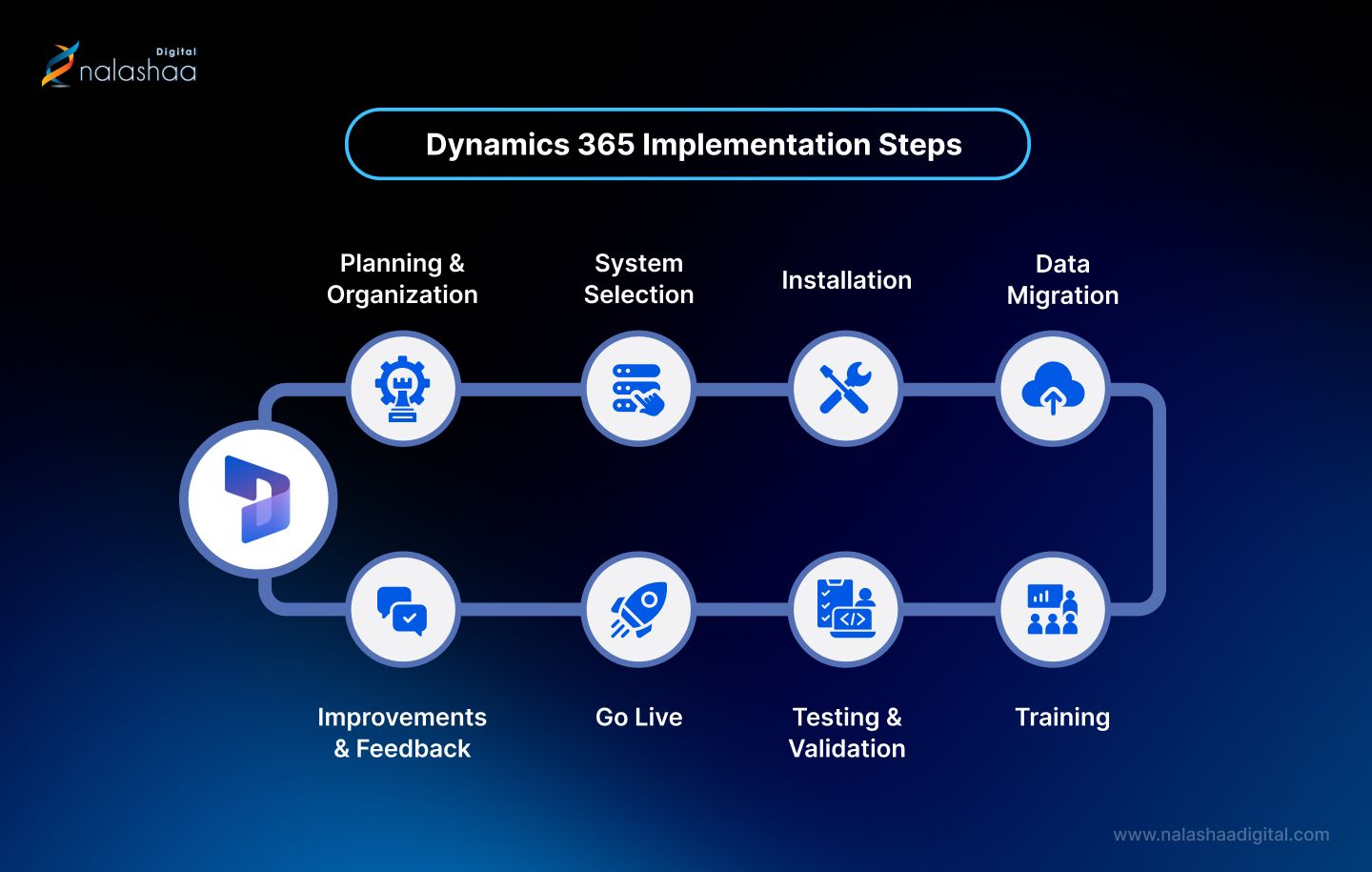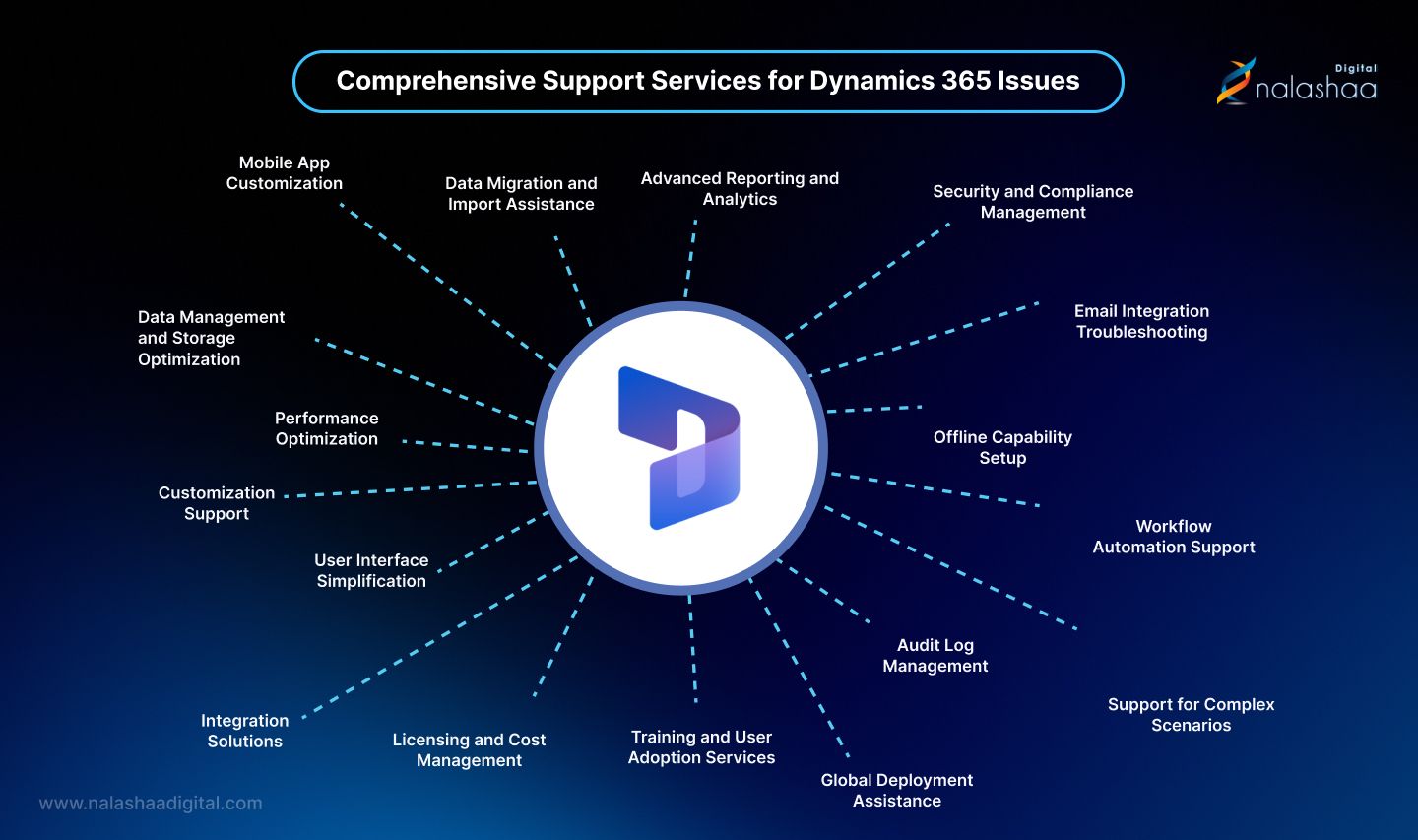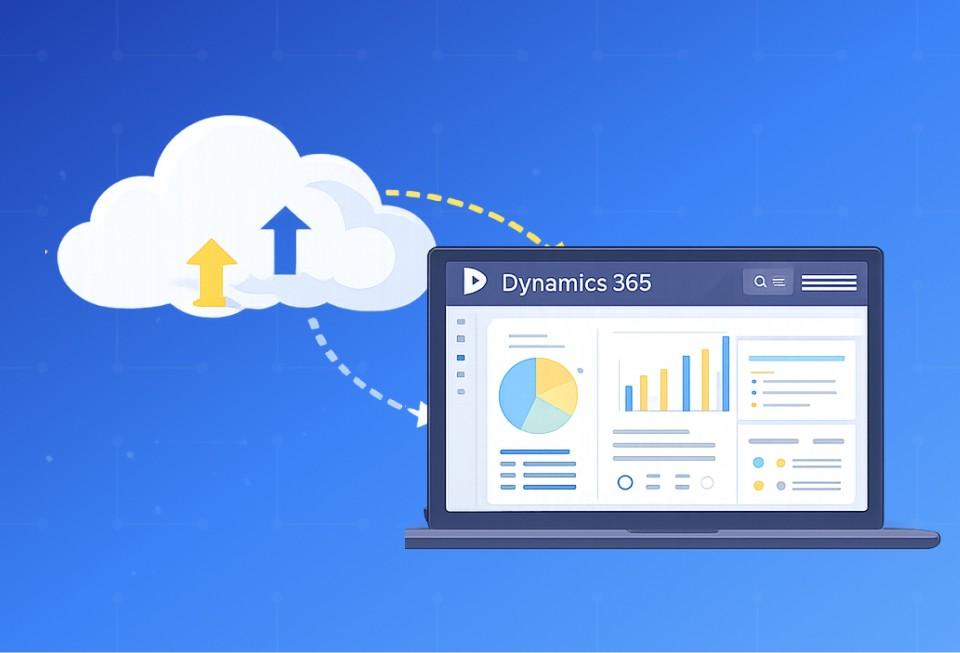Microsoft Dynamics 365 CRM Services Explained: [From Implementation to Support]
Jan 23, 2025 Aiswarya Madhu
Implementing a Customer Relationship Management solution is a critical step for organizations striving for growth and efficiency. Microsoft Dynamics 365 CRM services provide a comprehensive framework that encompasses not only the initial implementation but also ongoing support to ensure sustained success.
It is essential to understand that the implementation phase is just the beginning of a continuous journey in leveraging Dynamics 365 CRM for optimal business performance.
Having the right Dynamics 365 service provider by your side ensures that your CRM evolves alongside your business, empowering you to achieve long-term success.
On this Page
Understanding Dynamics 365 CRM Services [What to Expect?]
When businesses approach us for CRM solutions, it’s rarely just about technology—it’s about solving real challenges. Whether it’s streamlining sales pipelines, running data-driven marketing campaigns, or delivering seamless customer service, the core idea behind our Dynamics 365 CRM services is to address the pain points in a way that aligns with your specific goals.
Every business has its own rhythm, its own set of challenges, and its own aspirations. That’s why our Dynamics 365 consultants focus on understanding your operations deeply.
Below is a detailed look at how we’ve designed our Dynamics 365 CRM implementation services to address the specific concerns and interests of businesses that approach us.
Dynamics 365 Implementation Services
This initial phase focuses on configuring the CRM environment to align with organizational processes. It involves defining the scope, customizing modules, importing data, and ensuring system readiness for end-users. Successful implementation is crucial as it lays the foundation for the efficiency of the entire CRM system.

Let’s see a detailed scenario of how we tailor our Dynamics 365 CRM services to align with the unique implementation requirements of various companies, ensuring seamless integration, user adoption, and long-term value.
Understanding Requirements and Processes
A transportation company faced inefficiencies due to inconsistent sales workflows across various locations. By engaging stakeholders and conducting thorough process mapping, we identified critical gaps and redundancies. With this insight, we configured Dynamics 365 CRM to establish a unified system that streamlined operations, provided better data visibility, and aligned with the company’s overarching goals.
Similarly, in the healthcare sector, we worked with an organization where compliance with regulatory frameworks was paramount. By tailoring Dynamics 365 CRM to address these regulatory requirements, we ensured that the system supported not only operational needs but also enhanced patient management workflows.
If you’re thinking why we’ve shared these case studies, it’s because they show just how crucial it is to deeply understand workflows and unique challenges to create solutions that truly work for your business.
Data Migration Without Compromising Integrity
Effective data migration is more than just transferring information. It’s about ensuring accuracy, usability, and alignment with organizational goals. The case studies below illustrate how we helped our clients to get through the difficult phases in data migration.
For a global services provider, legacy systems housed inconsistent and fragmented data that had to be unified within Dynamics 365. We began with an extensive data audit to identify redundancies and gaps. By mapping legacy data to new fields in Dynamics 365, we ensured consistency while developing automated validation scripts to maintain accuracy during migration. Post-migration, comprehensive checks and reporting verified that the data not only met operational requirements but also supported decision-making across departments.
Similarly, in healthcare, a client faced the critical task of integrating Dynamics 365 with their EHR system while complying with strict regulatory standards. Beyond just transferring patient data, it was essential to preserve relational integrity and ensure real-time synchronization for seamless workflows. By leveraging Dynamics 365’s native integration tools and designing custom APIs, we bridged the systems efficiently. Data integrity checks were embedded at every stage, ensuring patient histories, scheduling, and compliance records remained intact and accessible.
Enhancing User Adoption
Driving user adoption is about more than introducing a new system; it’s about addressing resistance, ensuring usability, and aligning the solution with day-to-day needs. These examples illustrate how we partnered with organizations to foster acceptance and unlock the full potential of Dynamics 365.
A non-profit organization struggled with resistance to change among its diverse teams, each with unique operational needs. We began by engaging stakeholders across departments to understand their pain points and objectives. Role-specific training programs were developed, showcasing how the CRM could simplify their tasks and amplify their impact. This targeted approach, combined with ongoing support, not only eased the transition but also led to a threefold increase in productivity as users embraced the platform’s efficiency.
In a sports organization, user engagement was prioritized from the start. By involving teams early in the design and configuration phases, we tailored Dynamics 365 to align with their workflows, such as fan engagement strategies and event management. Interactive training sessions and a feedback-driven refinement process ensured users felt empowered and invested in the system. The outcome was a significant improvement in user acceptance, enabling enhanced audience connections and operational effectiveness.
Ready to take the next step?
Let our experts design a solution tailored to your unique business needs. From seamless implementation to ongoing support, we’re here to ensure your success.
Dynamics 365 Integration Services
For Dynamics 365 CRM to be truly effective, it must seamlessly integrate with other business systems.
Here’s an in-depth look at how our Dynamics 365 CRM services are meticulously tailored to meet the unique integration needs of every organization and the systems they rely on.
Understanding Requirements and Existing Systems
Every successful integration begins with a thorough understanding of an organization’s operational landscape. We engage stakeholders to identify pain points, define desired outcomes, and determine which systems—ERP platforms, e-commerce tools, or third-party applications—need to harmonize with Dynamics 365 CRM.
For example, a global retail chain needed to unify inventory and sales data across disparate systems. By analyzing their existing supply chain management and e-commerce platforms, we developed a Dynamics 365 integration strategy to standardize data formats and create a unified operational framework.
Designing a Scalable Integration Architecture
The architecture we design depends on the complexity of the integration. Options like point-to-point connections, middleware solutions (such as Azure Logic Apps), or API management platforms allow us to choose the most suitable approach for each project.
In one case, a healthcare provider required Dynamics 365 to interact seamlessly with their electronic health record (EHR) system. We implemented a middleware-based integration that automated workflows and ensured compliance with healthcare regulations, improving patient scheduling accuracy by 40%.
Building and Testing for Reliability
Developing integrations involves coding APIs, configuring middleware, and setting up workflows to connect systems effectively. But our approach goes beyond development—we prioritize rigorous testing. Unit tests ensure individual components work as intended, while integration and user acceptance testing validate that systems communicate seamlessly.
A manufacturing firm integrating IoT devices with Dynamics 365 for real-time production insights faced challenges with high data volumes. Through extensive testing, we ensured that the integration not only functioned smoothly but also provided accurate metrics for predictive maintenance, reducing downtime by 30%.
Ensuring Data Quality and Security
Data integrity is critical during integration. We focus on validating and cleaning data to prevent inaccuracies from disrupting operations. For instance, when consolidating customer data for an e-commerce business, we implemented robust validation protocols, enabling a 360-degree view of customer interactions while reducing response times by 50%.
Security is equally paramount. Encryption, secure authentication, and compliance with regulations like GDPR and HIPAA form the backbone of our integration solutions. This was especially crucial for a pharmaceutical company integrating Dynamics 365 with their laboratory information management system (LIMS), ensuring research data remained protected.
Supporting Long-Term Optimization
Integration is an ongoing process. Post-implementation, we monitor system performance and provide proactive maintenance to address any issues. Regularly revisiting the integration strategy ensures that it evolves alongside business needs and technological advancements.
For example, a sporting club using Dynamics 365 to manage fan interactions saw the need for advanced analytics as their engagement strategies matured. By optimizing their integration with additional tools, we enhanced their ability to analyze fan behavior and tailor marketing campaigns effectively.
Discover how Dynamics 365 integrates seamlessly with platforms like Salesforce, DocuSign, ZoomInfo, and EDI to streamline your workflows—read our detailed blogs for insights and methods.
Ongoing Support and Optimization Services
It is imperative to recognize that the completion of implementation does not signify the end of the journey. Instead, organizations must engage in continuous support and optimization of their Dynamics 365 CRM services to truly realize its potential. This ongoing relationship includes:
Below is a detailed scenario of how our Dynamics 365 CRM services are tailored to match the evolving needs of organizations post-implementation, ensuring that the system not only functions optimally but also empowers users to derive its full value.

Adapting Users to a New System
For one mid-sized manufacturing client transitioning from legacy systems to Dynamics 365, we observed initial resistance among employees due to the unfamiliar interface and advanced features. Teams in production and sales struggled with disrupted workflows and required extensive support to acclimate. Addressing this, we implemented role-specific training that allowed departments to focus on features most relevant to their functions. For example, sales teams received hands-on training on real-time inventory access, helping them address client inquiries effectively, while production teams were taught how to monitor supply chain metrics.
Additionally, we provided continuous onboarding resources, including video tutorials and user guides, allowing employees to independently explore and understand the system. This strategy not only reduced the learning curve but also improved confidence across teams.
Overcoming Data Challenges
A healthcare provider we worked with faced significant hurdles with inconsistent data after implementing Dynamics 365. Errors in patient records and scheduling data caused operational inefficiencies and user frustration. To address this, we conducted a thorough audit of their legacy systems before integrating the data into Dynamics 365. The migration strategy ensured accurate mapping of critical data fields, leaving no room for discrepancies.
Post-migration, we designed real-time dashboards for healthcare providers, granting them instant access to accurate appointment schedules and patient records. This resulted in a 40% reduction in scheduling errors and a noticeable improvement in patient satisfaction scores. By ensuring clean, reliable data, the client was able to rebuild trust in the new system among both staff and stakeholders.
Achieving Seamless Integration
For a global retail company integrating Dynamics 365 with its supply chain and e-commerce platforms, initial challenges included real-time data inconsistencies and fragmented workflows. Using Microsoft’s Azure Logic Apps, we bridged their systems, enabling live synchronization between inventory data and sales platforms. The integration also supported predictive analytics for stock management, allowing the client to align inventory with market demand.
This approach reduced operational inefficiencies, cutting costs by 20% and creating a more agile supply chain. By tailoring the integration to their specific needs, we eliminated silos, enabling seamless communication across systems and departments.
Building Confidence Through Proactive Support
A prominent non-profit organization implementing Dynamics 365 CRM faced challenges with user adaptation and ongoing operational needs due to limited resources. We established a dedicated helpdesk to address user concerns promptly, prioritizing issues based on complexity. Additionally, regular feedback sessions allowed us to identify pain points early, such as difficulties in managing donor interactions and campaign tracking.
Based on user input, we introduced automated workflows that streamlined donor communication and campaign analysis, improving efficiency by 68%. Our approach ensured that every employee felt supported, enhancing overall adoption and trust in the system.
The Way Forward
Dynamics 365 CRM services, when aligned with your specific business needs, not only streamline operations but also help you identify new opportunities for growth. With the right Microsoft Dynamics 365 Consultants, you gain a partner who evolves with your business, ensuring that your CRM system remains agile, secure, and future-ready.
At Nalashaa Digital, we are committed to helping you navigate every phase of your Dynamics 365 CRM journey. Whether you’re looking to implement, integrate, or optimize, our tailored solutions empower you to achieve long-term success and deliver unparalleled value to your customers.
Recent Posts

QuickBooks to Business Central Migration: A Complete Guide
Mar 02, 2026

AI in Dynamics 365 CE [Where It Actually Saves Money and How to Use It]
Feb 25, 2026

Business Central On-Premises to Online Migration [A Complete Guide]
Feb 20, 2026
Category
Our Expertise
About Author

Aiswarya Madhu
Aiswarya Madhu is an experienced content writer with extensive expertise in Microsoft Dynamics 365 and related Microsoft technologies. With over four years of experience in the technology domain, she has developed a deep understanding of Dynamics 365 applications, licensing, integrations, and their role in driving digital transformation for organizations across industries.
Never Miss News
Want to implement Dynamics 365?
We have plans which will meet your needs, and if not we can tweak them around a bit too!


